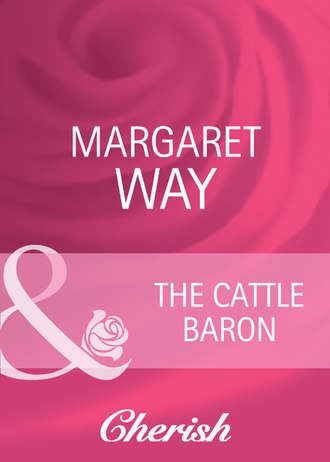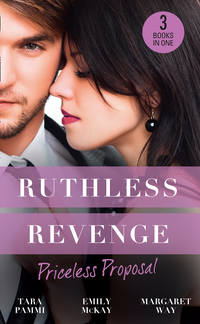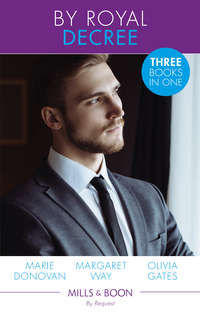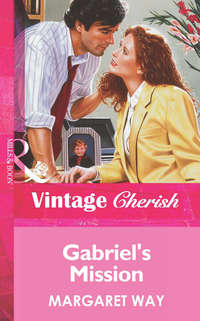
Полная версия
The Cattle Baron
“So I believe!” Dempsey actually chortled. “He was the guy who discovered those cave paintings in the Territory. Winjarra, wasn’t it?”
“How do you know all this stuff, Mick?” Banfield asked, genuinely wanting to hear the answer. There was Mick, sozzled most of the time, yet he always knew what was going on.
“I asked Lyn at the pub, of course. Lyn knows everything. Makes it her business.”
“Like you.” Banfield chuckled, and the sound made Mick laugh. Not altogether happily.
“For a while there, after Bridget died, Lyn thought she’d latch on to me, poor deluded woman. I found the one woman to love and I lost her.”
“But you did know love, Mick, didn’t you?” Banfield murmured. “You and Bridget lived for each other. Not everyone’s so lucky. You ought to let the good memories come. It might help.”
Mick’s veined blue eyes glistened, though he gave the younger man a cagey look. “I know I make you mad. Your dad would probably have dealt with it, but I’m not ready yet, son. Not yet. If ever. Anyway, I don’t want to go upsetting you. You have a big job on your hands.”
“Tell me about it!” Banfield let out a pent-up breath. “I’d sue the pants off Porter if he had anything left, but he went through his inheritance, as well as a fair bit of mine. God knows what on. A partial rebuild can’t account for it. My mother had refurbished the whole place only a few years before….”
“Those bloody antiquities.” Mick pulled his chair closer. “The whisper is, he’s got a lot of stuff he shouldn’t have all locked away from prying eyes. Remember how he was always going on about the ancient Egyptians having some sort of village on Three Moons?”
Again Banfield’s face changed. Became full of humor. “He believes it, too.” He rolled his eyes. “I think he’d have dug up every inch of Three Moons if he’d been allowed to.”
“Well, he did find those coins and the bits of pottery.” Mick smoothed down his magnificent mustache.
“Ptolemy IV.” Banfield nodded. “A couple of hundred years before Christ. Someone could easily have brought them into the country.”
“Who?” In the old days Mick had been fascinated with the whole question of an ancient Egyptian presence in Australia. “Spanish or Portuguese explorers?”
“Why not? The station fronts onto the sea,” Banfield pointed out. “They came in ships.”
“Why not the Egyptians, then?” Mick sounded a lot more focused now. “’Struth, they’ve found amulets, scarabs, hieroglyphics on cave walls. They’re there to be seen. The Aboriginal cave paintings show characters in Egyptian-style dress. They’ve found silver and bronze jewelry, even gold figures.”
“I know, Mick.” Banfield gave the older man a lazy smile. “It’s all very fascinating, but I’m far too busy to hare off after treasure, even if you and Porter are hooked on the old stories. And maybe this Marley guy. My uncle left Three Moons in pretty bad shape. I don’t know what would’ve happened without our old faithfuls like Moses and his crew to hold the fort. I know how many times you tried to offer Porter advice.”
“Porter just hated taking advice,” Mick said with considerable disgust. “If you ask me, he became drunk on power. Bloody near certifiable. He always wanted power and money, but without the responsibilities.”
Both men fell silent for a while, lost in their reflections. Both never quite free from the past.
Mick was the first to rouse. “Let me shout you another beer, son,” he said, turning. “I won’t have another scotch, if that’s what’s worrying you.”
Banfield answered quietly but with genuine feeling. “Nothing would make me happier than to have you back, Mick. And yes, I will have that beer. I’m not planning to drive home tonight. I thought I’d stay over at the pub.”
“Bonza!” Mick clapped a big friendly hand on Banfield’s arm, signaling a very unsure-looking waiter. “You can have dinner with me.”
“I didn’t know you ate anymore,” Banfield said dryly.
“I will tonight. And no more booze. Count on it.” Mick spoke earnestly. “That’s if you’ll honor your dad’s old mate.”
“Suits me fine,” Banfield said with more kindness than truth. He’d heard Mick’s promises before.
“Then we might get to meet this doctor guy.” Mick perked up. “Take a closer gander at the girlfriend. Never seen a woman as striking in me life, unless it was your mum. You’ve got your father’s rangy height and his strong cast of features, but you have your mother’s eyes. Tiger eyes, Bridget used to call them. Never saw a tiger in her life. Pure gold.” He shook his head. “The things we hand down to our children. You were the son of privilege, Chase. Heir to a great station. And wealth. But I reckon you’d give it all up to have your mum and dad back.”
Banfield leaned back in his chair, memories piercing his heart. “You’re right about that, Mick.”
“It’s the same with me.” Mick suddenly stood up and pitched the rest of his whiskey into the lush tropical garden. “Are you sure you can’t listen to what this professor has to say?” he asked. “I’ve got the funniest feeling it’s something to do with that cache old Porter dug up years ago. The coins and the pottery.”
“You and your treasure, Mick,” Banfield scoffed. “There is no treasure. There was no village. The ancient Egyptians were never on Three Moons.”
Mick plonked down again and summoned the hovering waiter. “How do you know?” he countered gleefully. “You weren’t there.”
MICK STUCK to his promise for the hour they stayed on at the club, drinking soda water with a dash of bitters, wincing with every mouthful as though it was poison. As the place filled up and the other members became aware that Mick was as close to sober as he’d been in years, a lot of the old camaraderie returned.
Banfield was a generation younger than most of the others, but as his father’s son he’d had been granted full membership as a matter of course. Being heir to a vast station was one thing. Running it when Porter Banfield had almost brought it to the brink was another. It didn’t take Chase Banfield long, three years at most, to establish that he could take his place with the best of them. From the day he returned home from university with an honors degree in economics and business administration, he had taken to calling in at the club. Not to drink, although he always had time for a quick beer, but to talk to his fellow cattlemen. Or, as he admitted openly to much friendly banter, to “pick their brains.” These were top cattlemen like his father. He had much to learn. A month later he turned twenty-one, and his uncle Porter’s guardianship was over. John Chase Banfield was in full control of his inheritance—his trust fund, his father’s business portfolio and historic Three Moons station. It was also the day he evicted his uncle. At last he was free to take over the reins and restore Three Moons to its former position as one of the great cattle stations of the world’s leading beef-producing country. He was afire to succeed. He had the brains, the strength, the determination, and he was a very fast learner.
IT WAS ONLY a short four-mile trip from the club into the town of Isis, the drive winding through towering banks of bougainvillea gone wild. A veritable jungle of the ubiquitous cerise and deep-purple flowers, with their dangerous hooked thorns. A drawback certainly but they looked magnificent, brilliant foils for the soaring palms and vivid orange-scarlet of the flame-of-the-forest that lit up the bush. In this part of the world, an enormous range of bougainvillea cultivars, the Thai golds, the pinks, the bronzes, the burnt oranges and scarlets adorned home gardens, showy and relatively easy to handle, but they never assumed the incredible height and splendor of the original bougainvillea gone wild. His mother had planted bridal white when she first came to Three Moons, training it over walls and pergolas and the balustrades of the veranda. Now great billowing veils of it made an unforgettable sight.
His mother! Would he ever in his lifetime be released from the grief? The might-have-beens? But grief had to be lived with. He was a Banfield and it was up to him to carry on a proud tradition, which Porter had almost wrecked. He’d never seen his uncle grieve, but perhaps he had in private. Porter was a strange one, with his own inner life, layers and layers of secrets. He was incapable of showing affection, if indeed he actually felt emotion outside his love of precious objects, especially antiquities. Inanimate possessions were the thing, not human relationships. Chase couldn’t begin to understand his uncle. He had long since stopped trying.
The sun had lost the worst of its heat, the cloudless cobalt sky giving way to another glorious tropical sunset. There were Mick’s Spanish galleons sailing majestically above, sweeping down the sky, their sails billowing crimson and gold. Poor old Mick! He held out no real hope that Mick would show up for dinner. Probably someone would let him sleep it off at the club.
After he’d gone a mile, he turned off the side road and onto the highway, saluting as always his grandfather, the town’s founding father who’d had the foresight to line the route with royal palms. They soared a uniform eighty feet, forming a superb entry into the little rain-forest town. Then the poincianas suddenly replaced them, forming an interlocking canopy over the main street, turning the air rosy when they were in bloom. North of Capricorn was a fantasy world, a paradise, a celebration of nature. He had visited other parts of the world, sailed around the glorious South Pacific with two of his university friends, but there was nowhere on earth he’d rather be than the place he was born. Three Moons. His great-great-grandfather, Patrick Banfield, an Englishman in search of adventure, had named it after the three almost perfect moon-shaped lagoons on the vast selection he’d taken on from the colonial Queensland government. Their characteristic feature was magnificent water lilies, and Patrick Banfield had realized they would be easily seen from the Malaysian-style homestead he planned to build.
All kinds of water birds still thronged to the lagoons—ibis, egrets, pelicans, ducks, magpie geese, pygmy geese, the brolgas, the blue cranes that mated for life. There were no beautiful water lilies farther back, in the swamp country. There the surface was completely overgrown with aquatic plants, the thick vegetation hiding the waterfowl and the crocodiles. The common crocodile mostly, freshwater, harmless, living mainly on fish. But the big stream the Aborigines called Gongora, the place of the sacred crocodile on Three Moons coastal border, was home to a few estuarine crocs that weren’t particular about what they ate. Anything and everything that might come to drink at the water’s edge. Birds, reptiles, mammals, tortoises, cattle, men.
The station had suffered three crocodile-related disasters over the years, which was close to a miracle, considering no one seemed to heed the warnings. Victim one at the turn of the century—an unwary stockman. Another in the 1930s when a visiting English cousin deliberately went after the legendary Munwari, the gigantic sacred crocodile said to be thousands of years old. Ah, the thrill of the kill! Everyone had warned him not to interfere with the crocodiles, a species that had survived unchanged for more than 150 million years, but according to the cousin, this was even better than hunting rhino in Africa. He’d made it to the upper reaches of Gongora, deep into country few white men had ever traveled; he’d never returned. A large search had been mounted, but it was as though he’d vanished from the face of the earth. The Aboriginal version of events was that the earth and not the Great Spirit guardian had swallowed him up; either way, he was never seen again. His story was part of the saga of the Wilderness Coast. A zoologist, the author of many scientific papers on reptiles, including crocodiles, lost a leg right up to the thigh in the course of his study of Munwari. That was in his father’s day. Porter had never allowed anyone else onto the station after that. Chase didn’t intend to, either, and that included Dr. Graeme Marley.
The last time, and it had to be two years, Marley had tried calling him. No go, especially when Marley had used Porter for a reference. Now Marley had decided to show up in person with his girlfriend in tow.
Girlfriend? Surely he’d seen a photograph someplace of Marley and a wife? A little brown hen to Marley’s peacock. It could even have been on TV. Marley had made quite a few appearances after he’d discovered and dated the Winjarra paintings. Ah! He remembered now. There was a journalist involved. A young woman. Banfield started to make the connections. A redhead. His mind ranged back over Mick’s description. Masses of orange hair. Obviously she wasn’t bothered by the fact that Marley was a married man.
Well, time hadn’t changed his mind. He had no intention of allowing Dr. Marley and his girlfriend to run around Three Moons uncovering more bric-a-brac. Probably stuff buried by poor old Porter, whose imagination worked on overdrive. Porter might be obsessed with “proving” the existence of some ancient Egyptian village in the wilds of the up-country, a real no-man’s-land; Chase was far more interested in what was happening on Three Moons here and now. The mustering had to be completed before the onset of the Wet between December and March. They were well into September, spring in the state capital, Brisbane, more than a thousand miles away. Life at Three Moons was dictated by the season. The Wet and the Dry. A creek that was little more than a trickle in the Dry could become a raging torrent in the Wet. If a cyclone blew in from the Coral Sea to the east, the Timor to the north, the Indian Ocean to the west, all hell broke loose. It was either one thing or the other—drought or flood—presided over by the timeless culture of the Aborigines. Banfield had great respect for the Aborigines and great sympathy for them as they coped with the problems that beset them as traditional life broke down. It wasn’t easy trying to adapt to the white man’s culture, almost diametrically opposed to their own. Aborigines were intimately attuned to the land. They weren’t terribly receptive to material gain. But they were the backbone of the big stations, splendid stockmen, trackers, horse breakers. The bush owed them a great debt. His childhood mentor had been Moses, not his uncle Porter. Moses was Three Moon’s leading stockman, the most loyal of employees and a tribal elder. Moses had been asked to look out for him in his childhood days when he’d been running wild. Moses had taken the job very seriously. Banfield didn’t know what he would’ve done without him in those first terrible years after he’d lost his parents and Porter had withdrawn to a place inside himself that could not be reached. Moses was a remarkable man. In many ways a foster father. It was men like Moses who had helped him win the battle to reestablish Three Moons.
CHAPTER THREE
HE WAS NOSING down a sharp rise when he was snatched out of his reverie by one hell of a sight. A small white car in the distance suddenly swerved off the road and took off down the thickly vegetated slope facing the sea. He saw at once why. A wallaby was still standing foolishly on the center line. The driver of the vehicle equally foolishly had swerved to avoid the animal. Just how far should you put yourself at risk? He felt a rush of anxiety for the driver, gunning the accelerator and covering the distance in record time. The main business of life was staying alive. No one would deliberately want to hit a harmless animal, but when the alternative was careering off the road, the only safe option was to hold course. If this accident had happened a mile back, the car would have hurtled down into an old volcanic crater. As it was, with the slope nowhere near so steep, the driver had a good chance of surviving. Still, it would be one hell of an experience, crashing wildly into the brush.
His four-wheel drive with its formidable bull bar slammed to a halt at the spot where he’d seen the small car go over. The tires had left skid marks on the road, and the trail led straight over the side. God! He pushed trailing branches of bougainvillea aside, taking the blood-raising lash as they snapped back, and looked down, wincing at what he might see. Instead, he felt a rush of relief and, it had to be said, admiration. The small car had come safely to rest in a dry gully with a bed of glittering stones, narrowly missing a huge boulder a few feet away. No sign of the driver, but then, he was looking at the passenger side.
Swiftly he got on his mobile and passed a message to Chipper Murray, the local police constable, then he reached into his vehicle for a good strong rope, knotting it securely to the bull bar. He touched his neck, felt a smarting, bleeding raised welt. Mercifully the gully was bone-dry. He went over the side, working his way down in a series of jumps much like the rappelling he used to enjoy. He got down easily, covering the small clearing to the car. The birds were singing. The sky was a cloudless peacock-blue. The air was sweet with the scent of the many species of wild herbs his boots had crushed.
He was almost at the driver’s door when it suddenly opened and a young woman swung her long jean-clad legs to the ground and leaned out. “Hi!” she said in a husky but otherwise perfectly focused voice. “What did I do wrong?”
He laughed over a hard wave of relief. This was a remarkably composed woman. “Regardless of what you did wrong, you’re obviously one hell of a driver.” He approached, studying her with considerable interest. Masses of marigold hair, skin as white as a snowflake, a sprinkling of freckles standing out in high relief, extraordinary eyes, green with gold flecks in them like sunlight on a deep lagoon.
“Skills get sharpened when you’re interested in staying alive,” she answered wryly. “It was the wallaby. No one warned me the darling little thing was out there waiting for me.”
“Next time slow right down, beep your horn and let it cross,” he advised, keeping an eye on her, afraid that she might pass out from delayed reaction.
Instead, she tried ineffectively to smooth down her magnificent hair. “It happened much too fast for that.”
He nodded in appreciation. “How are you feeling?” From the look of it, shock hadn’t yet set in. Either that or she was downright fearless. Just about anybody would have been a mess.
“I’ll be fine when the adrenaline levels out.”
“Good,” he replied. “Can you stand up? I want to see if you’re still in one piece.”
He put out his arm to assist her, but she rose unaided, tried a smile and stumbled. He caught her, hauling her along his chest.
“Okay, rest a minute.” His hand somehow found the back of her head, shaping its contours as though it had found a will of its own. She smelled of sunlight, fresh air, a bowl of limes.
She wasn’t about to argue, letting her marigold head fall against his shoulder. Tall for a woman. Slight, but he could feel the luscious press of her breasts. He couldn’t decide if she was teetering on plain or was the most striking woman he had ever seen. Either way, his reaction to her was strong and immediate, or maybe he was swept up in the sheer romance of it all.
She stirred after a moment and he murmured, “Take your time. Look on the bright side.”
“Which is?” At that she lifted her head, stared up at him with sparkling eyes.
“It could have been a lot worse. In the Wet that gully runs a torrent.”
“I have to get my thrills somehow.” She leaned back slowly and steadied herself by gripping his strong rugged arms. “Where did you spring from? Thanks for coming to my rescue, by the way.”
“I was right behind you when it happened.”
“So you saw the whole thing?”
He nodded. “I pretty much had a heart attack. I’m feeling a lot better now that I know you’re safe. Look, why don’t you slip back into your car? Rest quietly. The ambulance should be here soon.”
She did a double take. “What ambulance?” Her voice, which had been vibrant and musical, turned sharp and dismayed.
He stared down at her, raising his eyebrows. “The one that’s going to take you into town. I know you’re a defensive driver at the highest level, but you’ve had one hairy ride. Shock will set in. Believe me.”
She laughed, although her temples were beaded with sweat and her skin was whiter than white. “Get on your mobile. Tell them not to come.”
“I’m not sure that’s a good idea.”
“I’m talking to you, aren’t I? I’m quite rational.”
“Hold out your hands,” he ordered gently.
She did so without an instant’s hesitation.
“They’re trembling.” They were, too. Beautiful hands, long-fingered, elegant, the nails unpainted, but a nice length.
“I’m a bit shaken up, that’s all.” She shrugged, more easily able to size him up now. Her first impression was of someone larger than life, a man of mythic proportions. Hercules, Apollo, a bit of both. “Listen, I don’t want any fuss. You can drive me back to town, can’t you?”
Frowning, he studied her face. “If that’s what you want, but I have my doubts I’d be doing the right thing.”
“I’ve been in worse situations.”
“Yeah? When?” he asked skeptically.
“Try East Timor. Or dodging bullets in Afghanistan when you’re trying to talk on camera.”
He gave a devastating smile of approval, looking good enough to play the hero in a big adventure movie.
“Well, that doesn’t leave me with much else to say. Hang on a second and I’ll see if I can stop the ambulance. I’m Chase Banfield. And you’re…?”
One quirky eyebrow shot up. He probably knew exactly who she was, but she identified herself, anyway.
“Roslyn Sum-m-mers.” She’d briskly put her hand in his, then dragged out her name as a jolt of electricity flared through her body. Chase Banfield. Who else? She watched him as he half turned away, punching numbers into his mobile. He was wearing jeans and a bush shirt, and James Bond couldn’t look as good in a tuxedo. Tall. A lot taller than she. About six-three. Wide-shouldered, lean-hipped. A mane of deeply waving bronze hair. A wonderful gold tone to his skin. Beautiful topaz eyes, resembling a tiger’s. A strong distinctive face, sculpted, not chiseled like her own. High cheekbones, brackets around a handsomely cut mouth. Thirty, thirty-two. A man in full possession of his space. A man on his own territory. A fighter. A cattleman with the polished speaking voice of the elite. After Porter she wasn’t prepared for his maleness, his virility and splendor.
Chase Banfield. What else was there to say? The fates had thrown them together.
“So that’s okay,” he said, pushing the mobile back into the pouch on his belt. “No ambulance. Chipper is going to take a run out, though, and see what you’ve done.”
“Whoever Chipper is.” She could feel her heartbeat gradually returning to normal.
“Chipper Murray is our local police constable,” he explained. “A good man. He sees that nothing much goes wrong around here.”
“What’s he going to do? Arrest me for creating this mess?”
“Arresting people is part of the job, but no, you have nothing to fear. He’ll have enough on his hands trying to retrieve the car. Hire car, isn’t it?”
Rosie turned her head, kicked a tire lightly. “This is going to cost a pretty penny.”
“At least it didn’t kill you. So, Roslyn, what do we do now?”
Enterprising though she was, she didn’t think she could handle Chase Banfield. He was dynamite. Rosie took a long look up the slope. “I saw the way you got down. Piece of cake.”
He groaned. “Are you serious? A piece of cake for me. I don’t know about you.”
“Watch me.”
He was beginning to wonder if he could ever stop watching her. She was dressed like him in jeans and a shirt, only, he was never so entrancingly violently colorful. Her cotton shirt was a bright saffron. She had a couple of strings of multicolored glass beads around her neck and an ornate beaten-silver belt around her narrow waist. She reminded him of a field of wild poppies waving in the sun.
“Hang on,” he said, grasping her arm. “I can’t let you go just like that.”









